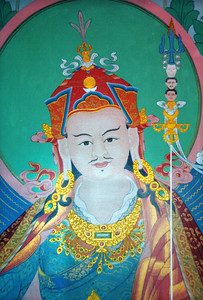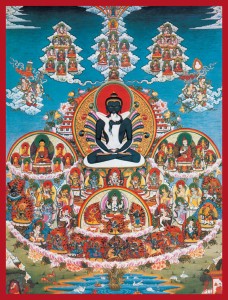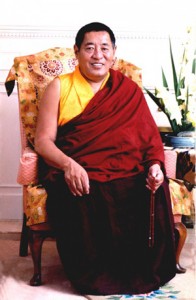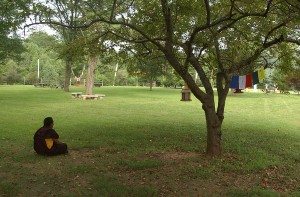An excerpt from a teaching called Compassion, Love, & Wisdom by Jetsunma Ahkon Lhamo
The Buddha considers that the point is to turn the mind to such a degree that you will not be shaken from your determination to practice pure Dharma that leads to the ultimate goal. You have a choice to practice in different ways. There is the Theravadin point of view, there is the Mahayana point of view and there is the Vajrayana point of view. In this Vajrayana point of view the path is difficult. You have to have a great deal of courage. But it is swift and it is certain, and we have an amazing history of beings who obtained realization in a very visible and provable way. Stories of Lamas who achieved truly miraculous signs through the power of their practice, who were able to perform in ways that were not ordinary, to accomplish things that were not ordinary and who also were able to display for our benefit extraordinary signs at the time of their death so that we would have faith.
Thinking that we should accomplish this ultimate goal, then we have to determine how we intend to accomplish that goal. We have to stay on that goal and we have to be true to that goal, in the same way that we can learn to be true to ourselves. When I say ‘to ourselves’ I don’t mean the self that we think we are, I mean the self that we really are, which is no self at all. The truth of our nature isn’t about ‘selfness’ at all. Our nature is that which is free and uncontrived, that which is awake and to which we have never been true, dancing around with phenomena as we do. Learning to be true to ourselves in that way, learning to be true to that nature, is the first time that we love.
I think that in one way it is the Mahayana view that we love ourselves too much and we are always trying to get something for ourselves. We are always trying to do what’s right for us and be gratified in some way. And that is true that is the Mahayana view. That is absolutely the truth. We should instead think of others. But I think there is another way to understand it; we seem to be running around constantly trying to destroy ourselves rather than loving that nature enough to allow ourselves to realize it, to be true to it. I think it is important to understand that in order to obtain true wisdom we have to learn to love that nature, we have to learn to love that nature in such a way that we can be true to that which we really are.
Having reached some awareness of that nature and having practiced sincerely, remaining stable within that nature and within that awareness is the next thing to be considered. It is common that during experiences of meditation you will have momentary experiences that can seem very blissful. They can seem very exciting, they can seem very peaceful, they can seem for one moment as though you had forgotten yourself and there was a sense of liberation because of that. These are all things that happen as you practice, but if they become the place where you stop or if you desire them or grasp them to you in such a way that you can go no further, you lose it immediately. Why? Because the minute you try to do that you are no longer with it. The minute you try to take that conceptualization in an iron clad way, wrap that conceptualization around the experience that you just had, you just lost the natural state. It is no longer natural. It’s contrived. You made it up and so you lose it immediately. But also if you use that particular experience to increase your desire and pride, or even to increase the grasping that comes with loyalty to memories or experiences, if you use it in that way it becomes something opposite to that which leads to Enlightenment. You take a side path and end up not going in the direction you wanted. You end up losing that pristine, poised balance in which the mind needs to remain in order to remain steadfast in that natural state. It becomes important to remain stable in your practice.
© Jetsunma Ahkön Lhamo

![brass_ring[1]](https://www.tibetanbuddhistaltar.org/wp-content/uploads/2010/10/brass_ring1-221x300.png)


![CandleBurning2Ends-253x170[1]](https://www.tibetanbuddhistaltar.org/wp-content/uploads/2010/10/CandleBurning2Ends-253x1701.jpg)




